Since late 2014, the developers of the Canadian wilderness survival game The Long Dark have refined the game’s interface, made its ravenous virtual wildlife smarter and added numerous player challenges. They’re planning to add a story, too, but the best facet of The Long Dark was there from the start: The game is slow. Really slow.
Speedy games are great, but Hinterland Studio’s creation is the most compelling of crawls. Going places in The Long Dark takes forever. You start by being dropped at a random point in one of the game’s five regions, at a random time and in random weather conditions, and look around you. The snow-blanketed wilderness all looks the same. It’s easy to get turned around and lose your way. Your character walks almost frustratingly slowly. They can’t jump, forcing them to walk around obstacles, and they sprain their ankle if they slip down an incline or off a rock. A short stamina bar makes running a bad choice except in the most dire of circumstances. That bar refills slowly, of course. If you cross paths with a wolf or bear, running is more likely to get you killed than if you keep your cool. Your best choice in this game is to simply plod everywhere, punctuating the silence with the crunch of your footsteps, as trees occasionally rattle in the wind.
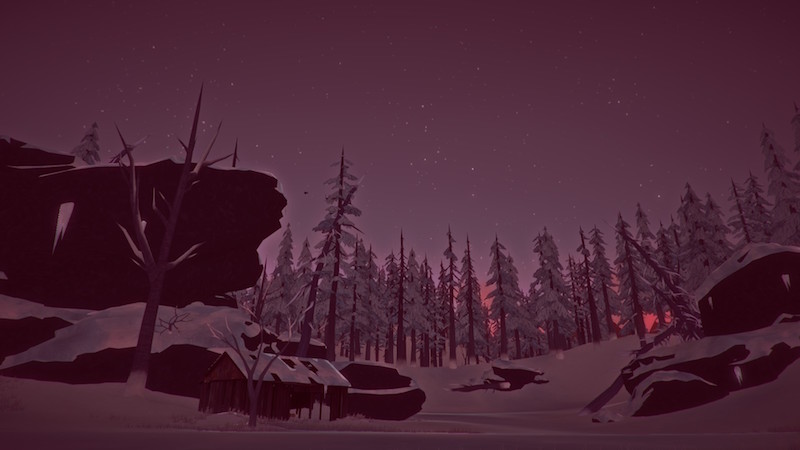
The slow pace of The Long Dark is unusual and brilliant for a survival game. It mixes the tension of staying alive with a mellow pace. You grow attached to your character and their hard-won progress through the map. Each piece of loot you scoop up — a brisk affair in most survival games — has a journey attached to it, a little narrative in the bigger scheme of your quest to survive. When I start a new game, I tend to stick to Mystery Lake, the map I know the best. I have a favourite routine of setting up shop in the Camp Office by the lake and spending an entire in-game day looting the fishing huts and cabins. I’m careful to keep the shore to my right as I make my circuit, trying to keep track of which spots I’ve looted already, taking the long way around the wolves that tend to make their home here. Sometimes a snowstorm or too many wolves impede my progress and force me to take shelter for the night; I feel impossibly far from home in these instances, even though my base is visible at the far end of my screen.
In Don’t Starve, by contrast, you can strip an area of resources and be forced to push outward in no time, or you can quickly gather the materials necessary to start building up the complex base of your dreams. In ARK: Survival Evolved, you have to be on the constant lookout for predators and other players. You can’t really leisurely loll by the beach.
Most of your time in The Long Dark is spent meandering from place to place doing mundane tasks like gathering sticks and opening drawers. You do these things in a steady, nourishing rhythm even as the slow onset of death looms. The food you gather gradually goes bad. Your equipment degrades, too. You can suffer from hypothermia, starvation, exhaustion and dehydration, but these conditions take a long time to set in and a bit longer before they chip away at your health bar and eventually kill you. Sudden events like wolf attacks will injure you but rarely kill you outright, making them easily survivable if you have or can gather the requisite first aid. Curing afflictions in general is achievable but time-consuming. For example, this is only a fraction of how long it takes to start a fire to keep from freezing:
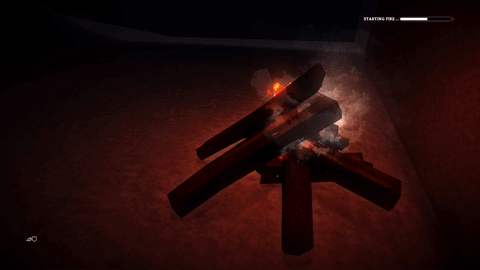
It takes forever to die. Once, I was dropped into a new region at night during a snowstorm. I wandered blindly, my screen a blur of black and white. I slowly froze, huddled against the burnt-out remains of a house, miserably watching my health meter tick down from 100 to 0. As the sun rose and my vision blurred, I spotted a farmhouse not 6m away. I knew I’d never reach it. The distance would have been negligible in any other video game but was impossible for my character in her current condition. A video of this gameplay would be as boring as watching water freeze — 10 minutes of low-poly snow as my character grumbles and groans — but this was one of the most satisfying deaths I’ve ever had in a game, and I was on the edge of my seat the entire, interminable time.
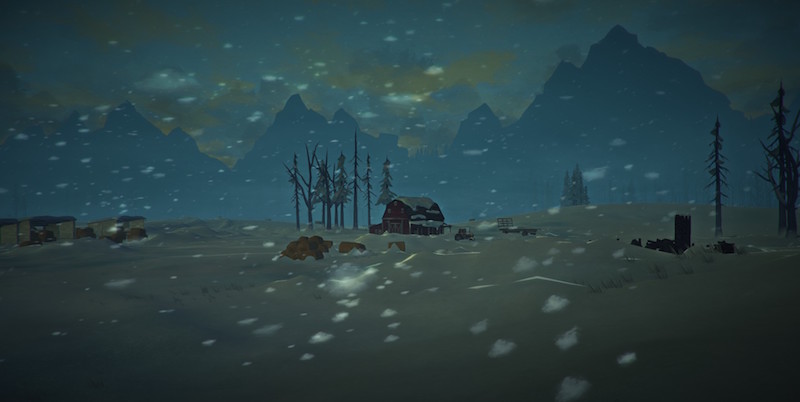
That speck of brown in the corner is the house I died next to. Even this picture makes me angry.
When I play, I’m constantly reminded of the journals of early polar explorers. For all the heroics of Ernest Shackleton or the tragedy of Robert Falcon Scott, most of the diaries of polar exploration are comprised of hundreds of pages of day-to-day drudgery. Fridtjof Nansen, considered the father of polar exploration, wrote of his Arctic explorations, “There was not much variety in our life. It consisted of cooking and eating breakfast in the morning. Then, perhaps, came another nap… Many days would sometimes pass almost without our putting our heads out of the passage… sleep[ing] as long as possible, to pass the time… Our life was so monotonous that there was nothing to write about.”
Elisha Kent Kane, an Arctic explorer whose religious ambitions make his journal rife with ecstatic hymns to icebergs, also wrote, “…we spent many miserable hours… We slept and cooked coffee, and drank coffee, and slept and cooked coffee, and drank again; and when our tired instincts told us that twelve hours had passed, we treated ourselves to a meal — that is to say, we divided impartial bites out of the raw hind leg of a fox to give zest to our biscuits spread with frozen tallow. We then turned in to sleep again.”
When Shackleton’s Endurance was finally crushed by the Antarctic ice, his journals record the mundanity of his crew bickering over “such trifles as the strength of a brew of tea… Day by day goes by, much the same as one another. We work; we talk; we eat.”
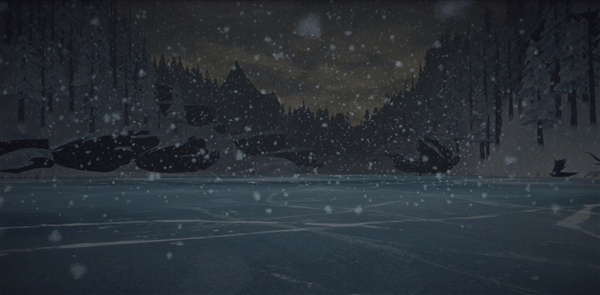
In these examples, eating is at once a pleasure and an oppression. People who are starving get bored of eating. People who are freezing long to go outside in the cold. Through its pace, The Long Dark nails this unexpected reality perfectly. It captures the drudgery of actually surviving, something all of us are familiar with in one form or another.
While survival games strive to turn the tasks of daily living into a game, they sacrifice realism in pursuit of exciting gameplay. But The Long Dark creates this excitement by adorning every aspect with effort and by adding the additional burden of time to your inventory. It produces a stressful experience, but one that is also extraordinarily peaceful. A wolf might attack. A snow storm blows in. A slow trek affords me plenty of time to watch the sky change colour as a flurry starts to fall. I can hurry or take my time. I can relax or hunch my shoulders with effort. I can take in the scenery while staying single-mindedly fixed on trying to live another hour.
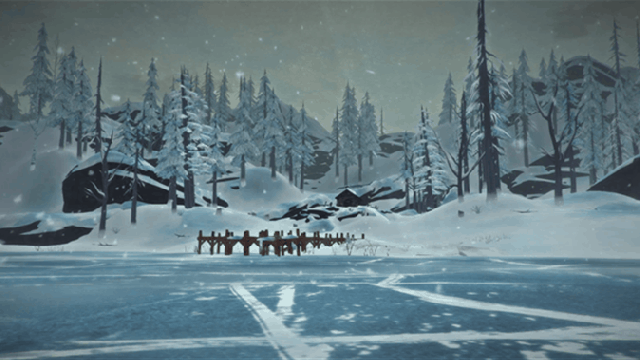
Comments
3 responses to “The Long Dark Is Boring And That’s Why It’s Great”
Oh yeah, I backed this on Kickstarter and installed it when I got my code. I should play it some time.
Nice piece Riley and as someone who has sunk over 100 hours into the sandbox I’m quite looking forward to the story mode, although the recent challenges have been nice too.
It also has really nice sounds